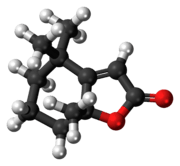Dihydroactinidiolide
 | |
 | |
| Names | |
|---|---|
| IUPAC names
(7aR)-5,6,7,7a-Tetrahydro-4,4,7a- trimethyl-2(4H)-benzofuranone | |
| Other names
Dihydroactinidiolide | |
| Identifiers | |
| 17092-92-1 | |
| 3D model (Jmol) | Interactive image Interactive image |
| ChemSpider | 4937432 |
| ECHA InfoCard | 100.169.249 |
| PubChem | 6432173 |
| |
| |
| Properties | |
| C11H16O2 | |
| Molar mass | 180.24 g/mol |
| Except where otherwise noted, data are given for materials in their standard state (at 25 °C [77 °F], 100 kPa). | |
| | |
| Infobox references | |
Dihydroactinidiolide is a volatile terpene. It has a sweet, tea-like odor and is used as a fragrance. Dihydroactinidiolide occurs naturally in black tea, fenugreek, fire ants, mangos, silver vine (Actinidia polygama), and tobacco. It has also been prepared synthetically.[1]
Dihydroactinidiolide is a pheromone for a variety of insects;[2] for example, it is one of the three components of the pheromone for queen recognition of the workers of the red fire ant.[3]
As with nepetalactone, found in catnip, dihydroactinidiolide is a cat attractant. Cultivators of silver vine (which contains another such chemical, actinidine, which is also a cat attractant) sometimes find their plants destroyed by enthusiastic cats.
References
- ↑ S. Yao, M. Johannsen, R.G. Hazell, K.A. Jorgensen, J. Org. Chem., 63, 118-121.
- ↑ Pherobase listing for dihydroactinidiolide
- ↑ Rocca, J.R. Tumlinson, J.H., Glancey, B.M., Lofgren, C.S., Tetrahedron Lett., 1983, 24, 1889.
External links
This article is issued from Wikipedia - version of the 5/11/2015. The text is available under the Creative Commons Attribution/Share Alike but additional terms may apply for the media files.